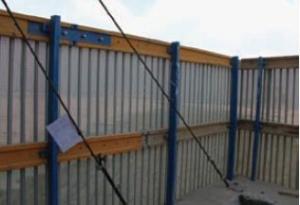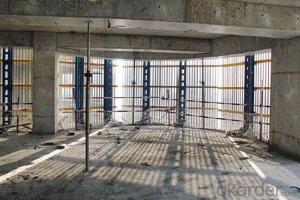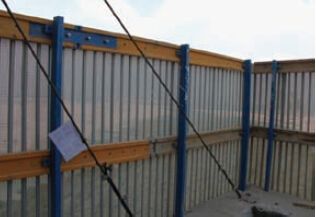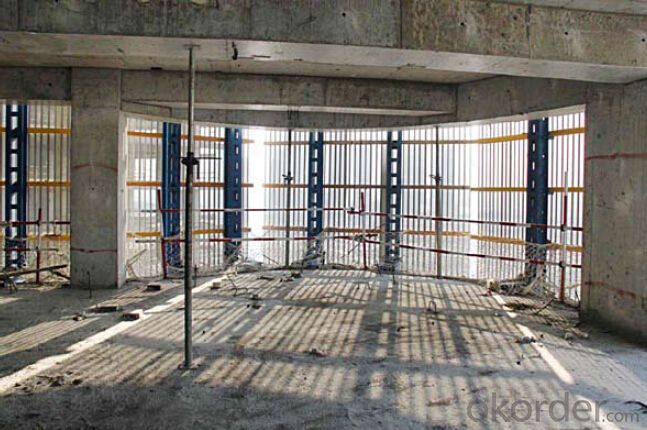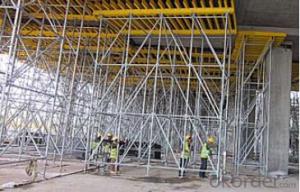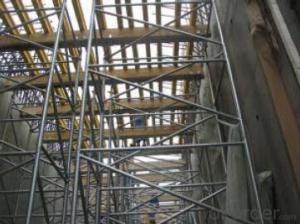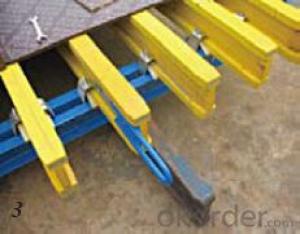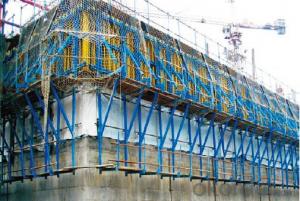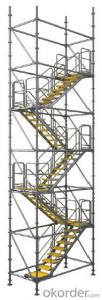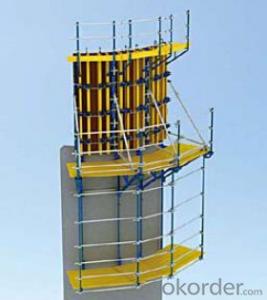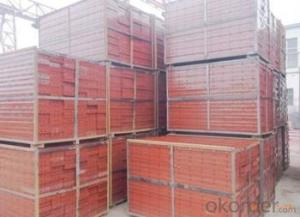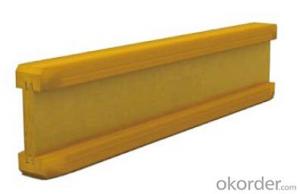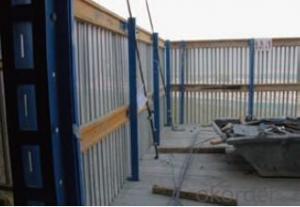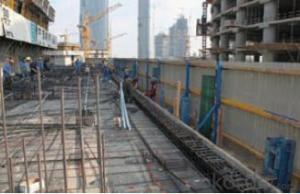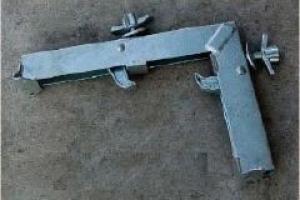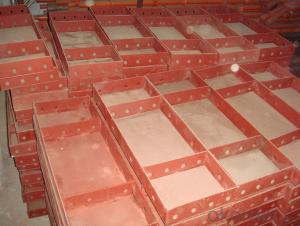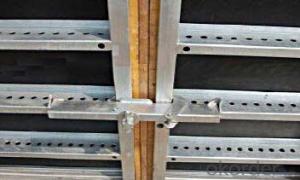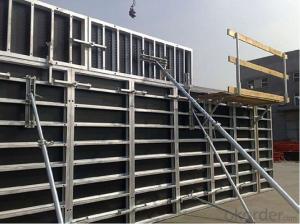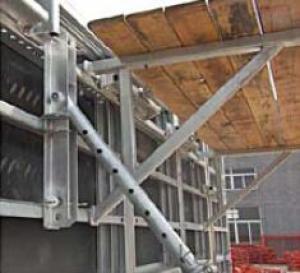Protection Platform for formwork and scaffolding system
- Loading Port:
- Tianjin
- Payment Terms:
- TT OR LC
- Min Order Qty:
- 50 m²
- Supply Capability:
- 1000 m²/month
OKorder Service Pledge
OKorder Financial Service
You Might Also Like
Protection Platform PP-50
A kind of new type construction protection system, applying operating platform and safer job
location for construction corps.
Characteristics:
◆ Easy and quick assembling.
◆ Lifted as a group, it is rapid and economic.
◆ Auto-climbing
◆ A safe and reliable anchor system
1. Composition
2. Assembly process of anchor system
(1) Embed V-climbing cone and anchor plate into the slab.
(2) Fix anchor shoe on the slab by tensile bolt.
(3) The fixed anchor shoe.
◆ High work efficiency with work platform and unload platform
◆ High light transmittance with the hollow block
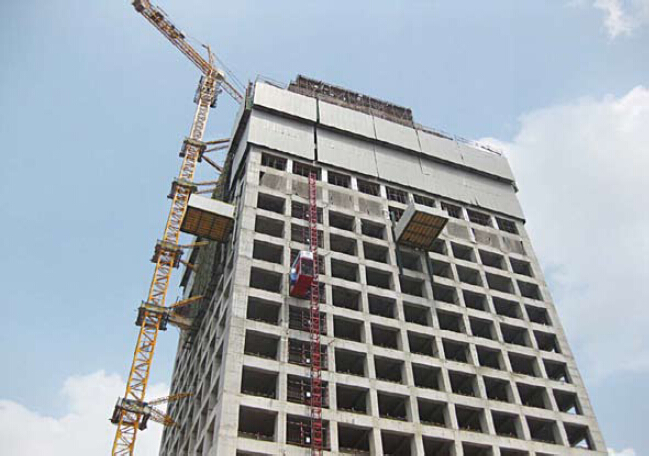
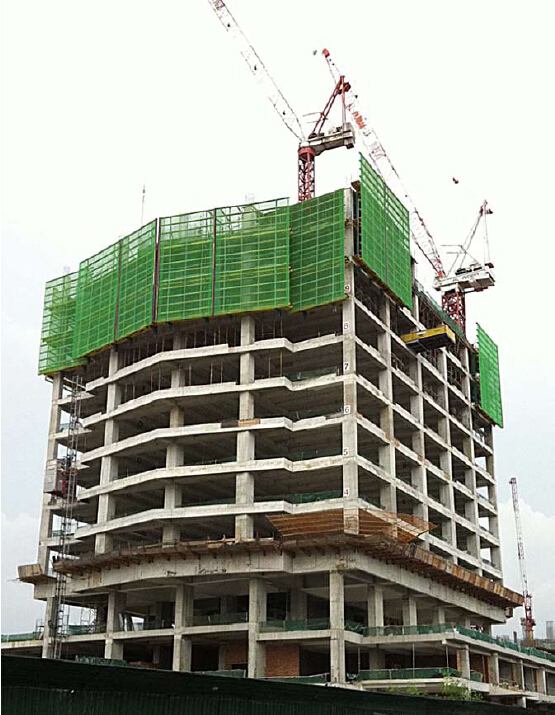
- Q: Can steel formwork be used for curved or irregular structures?
- Indeed, curved or irregular structures can be constructed using steel formwork. The utilization of steel formwork provides design flexibility and enables the easy shaping or fabrication of intricate geometries. Its strength and durability allow it to endure the immense pressure exerted during the pouring of concrete. With the ability to effortlessly adjust and adapt, steel formwork is well-suited for constructing structures with distinctive architectural designs or intricate layouts that incorporate curves, bends, or irregular shapes. Furthermore, the implementation of steel formwork guarantees a sleek finish to the concrete surface, resulting in structures of exceptional quality and aesthetic appeal.
- Q: What are the different types of coatings available for steel formwork?
- There are several types of coatings available for steel formwork, including epoxy coatings, polyurethane coatings, zinc coatings, and galvanized coatings. These coatings help protect the steel from corrosion, provide better surface finish, and increase the lifespan of the formwork.
- Q: How does steel formwork affect the overall energy efficiency of a structure?
- Steel formwork can have a significant impact on the overall energy efficiency of a structure. Firstly, steel formwork is known for its durability and strength, which allows it to be reused multiple times. This reusability reduces the need for new formwork materials, thereby minimizing waste generation and conserving resources. By reducing the amount of waste produced during construction, the overall environmental impact is reduced, leading to improved energy efficiency. Additionally, steel formwork offers excellent thermal properties. It has a high thermal mass, meaning it can absorb and store heat energy effectively. This characteristic helps regulate the temperature inside the structure, reducing the reliance on heating or cooling systems. By stabilizing the internal temperature, the energy consumption for climate control is reduced, resulting in improved energy efficiency and lower operational costs. Furthermore, steel formwork enables the construction of energy-efficient designs. Its versatility allows for complex shapes and configurations, facilitating the integration of energy-saving elements such as insulation, ventilation systems, and renewable energy technologies. These features contribute to the overall energy performance of the structure, enhancing its efficiency and sustainability. Overall, steel formwork positively impacts the energy efficiency of a structure by reducing waste, providing excellent thermal properties, and enabling energy-efficient designs. By utilizing steel formwork, construction projects can achieve higher levels of sustainability and contribute to a greener and more energy-efficient built environment.
- Q: Can steel formwork be used in high-rise construction?
- Yes, steel formwork can be used in high-rise construction. Steel formwork offers several advantages that make it suitable for high-rise construction projects. Firstly, steel formwork is strong and durable, capable of withstanding the high pressure of concrete placement in tall structures. It provides stability and rigidity, ensuring the formwork remains intact during the construction process. Additionally, steel formwork is versatile and can be easily customized to meet the specific requirements of high-rise buildings. It can be easily adjusted and reconfigured to accommodate various shapes and sizes, allowing for flexible and efficient construction. Steel formwork also provides a smooth and high-quality finish to concrete surfaces, which is crucial for high-rise buildings that require aesthetic appeal. Moreover, steel formwork is reusable, reducing the overall cost of construction. Unlike traditional timber formwork, steel formwork can be dismantled and reused multiple times, making it a cost-effective solution for high-rise projects. This also reduces waste and promotes sustainability in construction. Lastly, steel formwork offers enhanced safety during high-rise construction. Its strength and stability minimize the risk of accidents and collapses, creating a safer working environment for construction workers. In conclusion, steel formwork can indeed be used in high-rise construction due to its strength, versatility, cost-effectiveness, and safety features. It is a reliable and efficient solution that meets the unique requirements of tall structures.
- Q: Can steel formwork be used for both interior and exterior applications?
- Yes, steel formwork can be used for both interior and exterior applications. Steel formwork is highly durable and can withstand various weather conditions, making it suitable for both indoor and outdoor construction projects. Its versatility and strength make it a preferred choice for many construction applications.
- Q: Can steel formwork be used for both straight and curved concrete walls?
- Certainly, both straight and curved concrete walls can be constructed using steel formwork. The versatility of steel formwork lies in its ability to be effortlessly bent and adjusted, enabling the creation of curved walls in diverse sizes and shapes. By providing robust support and stability, it ensures the construction of both straight and curved walls with utmost precision and accuracy. Moreover, steel formwork's durability and reusability render it a cost-effective choice for projects necessitating both straight and curved concrete walls.
- Q: Can steel formwork be used for underground culverts?
- Yes, steel formwork can be used for underground culverts. Steel formwork is known for its durability, strength, and ability to withstand heavy loads and pressure. This makes it suitable for constructing underground culverts, which are designed to carry water, sewage, or other fluids below the ground surface. Steel formwork provides a rigid structure that can withstand the weight of the soil and any traffic loads above it, ensuring the stability and longevity of the culvert. Additionally, steel formwork is versatile and can be easily customized to accommodate different sizes and shapes of culverts. Overall, steel formwork is a reliable and efficient choice for constructing underground culverts.
- Q: What are the different types of bracing used with steel formwork?
- There are several types of bracing used with steel formwork, each serving a specific purpose in ensuring the stability and strength of the structure being formed. 1. Diagonal Bracing: This type of bracing is used to provide stability and prevent lateral movement of the formwork. Diagonal braces are typically installed at an angle between two corners of the formwork, forming an "X" shape. They help distribute the loads evenly and resist the forces acting on the structure. 2. Vertical Bracing: Vertical braces are used to support the formwork vertically and prevent any sagging or bulging. They are typically installed along the height of the formwork at regular intervals, providing additional support and rigidity to the structure. 3. Horizontal Bracing: Horizontal braces are used to resist the horizontal forces acting on the formwork. They are installed horizontally, typically at the top and bottom of the formwork or at specific intervals along the length, providing stability and preventing any deformation caused by external loads. 4. Tension Rod Bracing: Tension rods are used to distribute the loads and provide additional reinforcement to the formwork. They are usually installed diagonally or horizontally, depending on the specific requirements of the structure. Tension rod bracing is particularly effective in resisting excessive deflection and preventing the formwork from collapsing under heavy loads. 5. External Bracing: External bracing is used when additional support is required, especially in cases where the formwork is exposed to high wind loads or other external forces. These braces are typically installed on the outer side of the formwork and are designed to provide extra stability and prevent any deformations caused by external factors. 6. Tie Rods: Tie rods are used to hold the formwork together and provide uniform pressure on the structure. They are usually installed horizontally or vertically and are tightened with nuts to secure the formwork in place. Tie rods also help distribute the loads evenly across the formwork, preventing any bulging or deformation. Overall, the different types of bracing used with steel formwork play a crucial role in ensuring the stability, strength, and integrity of the structure being formed. They work together to resist external forces, distribute loads evenly, and prevent any deformations or failures during the construction process.
- Q: How does steel formwork handle different concrete surface slip resistance?
- Steel formwork, a versatile and robust material commonly used in construction, is essential for shaping and supporting concrete during the curing process. In terms of managing slip resistance on concrete surfaces, steel formwork offers numerous benefits. Firstly, steel formwork guarantees a smooth and uniform surface for pouring concrete, minimizing variations in slip resistance. Unlike materials like wood, steel does not warp or deform, ensuring consistent contact between the formwork and concrete. This uniformity promotes a more consistent concrete surface, reducing the risk of uneven slip resistance. Furthermore, steel formwork allows for the utilization of different surface treatments and coatings that can enhance slip resistance. For example, before pouring the concrete, anti-slip coatings or aggregates can be applied to the formwork surface, creating a textured surface that improves traction. These treatments can be customized to meet specific requirements for slip resistance, providing design flexibility. Moreover, steel formwork is extremely durable and resistant to wear and tear. This durability ensures that the formwork maintains its structural integrity throughout the concrete pouring process, minimizing the occurrence of surface irregularities that could affect slip resistance. Additionally, steel formwork is easy to clean and maintain, ensuring that any contaminants or debris that could impact slip resistance are promptly addressed. In conclusion, steel formwork effectively manages different levels of slip resistance on concrete surfaces by providing a smooth and consistent surface, allowing for customization through various treatments, and maintaining durability to prevent surface irregularities. Its strength and versatility make steel formwork a dependable choice for construction projects where slip resistance is a concern.
- Q: How does steel formwork affect the overall fire resistance of a building?
- Steel formwork does not directly affect the overall fire resistance of a building. Fire resistance in a building is primarily determined by the materials used for structural components such as columns, beams, and floors. However, steel formwork can indirectly impact the fire resistance of a building in a few ways. Firstly, steel formwork is often used for constructing concrete structures. Concrete itself has good fire resistance properties, as it is a non-combustible material. When steel formwork is used to mold concrete, it helps create a fire-resistant structure by providing a strong and durable framework for the concrete to be poured into. This ensures that the structure will remain intact under high temperatures and prevent the collapse of the building during a fire. Secondly, steel formwork can also contribute to the fire resistance of a building through its ability to withstand high temperatures. Unlike other types of formwork materials, such as wood or plastic, steel formwork is less susceptible to burning or melting. This means that even in the event of a fire, the steel formwork will not contribute to the spread of flames or release toxic fumes, which can help to contain the fire and minimize its impact on the overall fire resistance of the building. Lastly, steel formwork can also indirectly affect the fire resistance of a building by facilitating the installation of fire protection measures. Steel formwork provides a smooth and sturdy surface, allowing for the easy application of fire-resistant coatings, such as intumescent paint or fireproof sprays. These coatings enhance the fire resistance of the structure by providing an additional layer of protection against heat transfer and fire spread. In summary, while steel formwork itself does not directly impact the fire resistance of a building, it plays a crucial role in creating a fire-resistant structure by providing a strong framework for concrete, withstanding high temperatures, and facilitating the installation of fire protection measures.
Send your message to us
Protection Platform for formwork and scaffolding system
- Loading Port:
- Tianjin
- Payment Terms:
- TT OR LC
- Min Order Qty:
- 50 m²
- Supply Capability:
- 1000 m²/month
OKorder Service Pledge
OKorder Financial Service
Similar products
Hot products
Hot Searches
Related keywords
